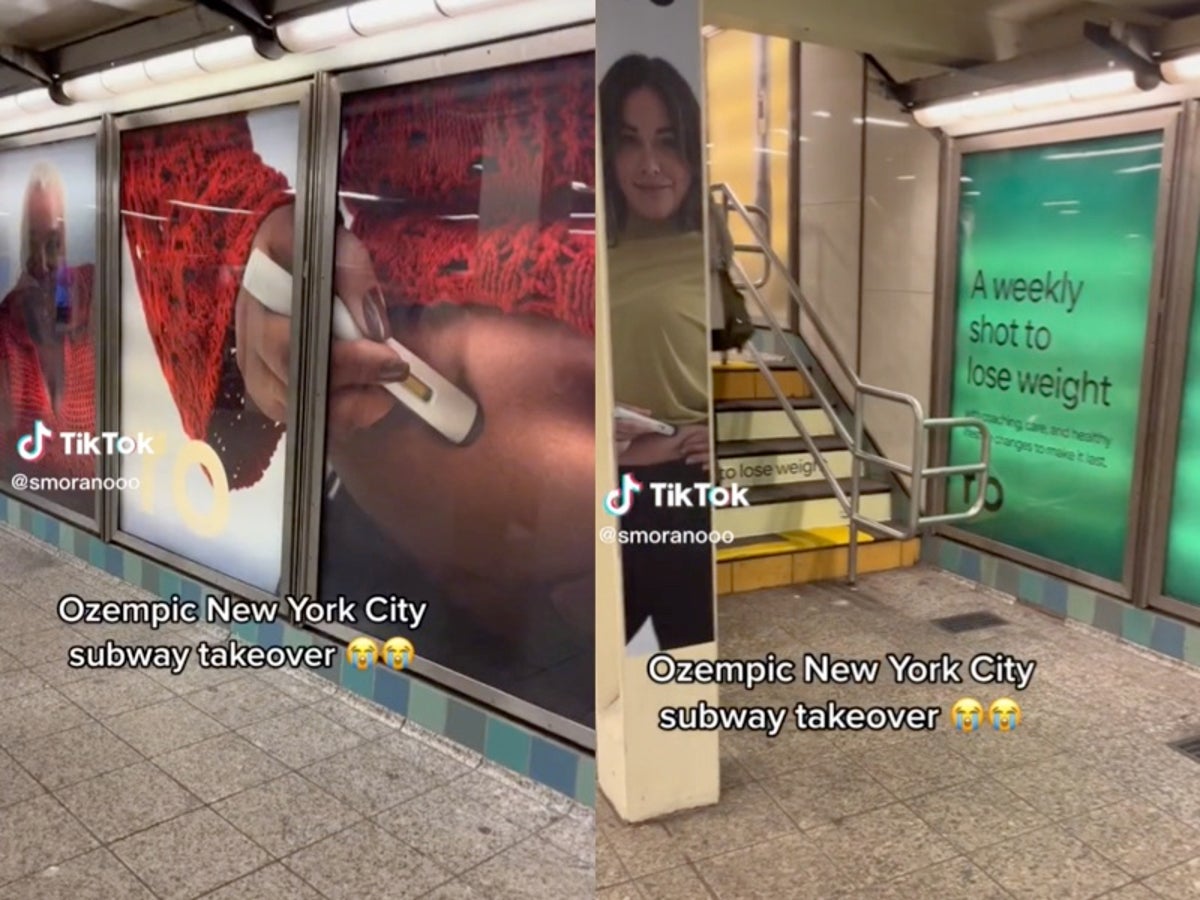
An influencer has sparked a conversation about the United States’ relationship with prescription drugs after filming an ad for injectable weight-loss medications in the subway station.
Sara, who goes by the username @smoranooo on TikTok, shared a video of the ad she saw in the Times Square subway last week. In the video, Sara filmed an entire wall, columns, and stairs covered with ads for Ro, a telehealth company that is offering a weight loss program with Wegovy prescriptions.
Wegovy, a brand name for semaglutide, is an injectable prescription medication for adults with obesity. The medication, which is FDA approved, is the same drug as Ozempic, an FDA-approved for the treatment of type 2 diabetes that is often prescribed for weight loss.
In the floor-to-ceiling ads viewed by Sara, Ro advertises the weight-loss medications as “a weekly shot to lose weight,” with the campaign showing individuals injecting the medication into their arms or stomachs.
The ad also encourages those interested in the medication to visit ro.co/shot. On the company’s website, it advertises its new Body Program, which offers customers the option to “lose weight with Wegovy”.
“There’s a reason everyone is talking about Wegovy and Ozempic. They work!” the company’s website reads, adding: “On average, people on Wegovy lose 15 per cent of their weight in a year.”
As for what the Body Program, which costs $135 a month, entails, the telehealth company says the program helps patients “lose weight by pairing revolutionary medication with coaching, care, and healthy lifestyle changes to make it last”.
However, the company also notes that, if a patient’s insurance does not cover the prescriptions, “you’ll have the option to either pay for the medication out of pocket (typically $900 to $1,600 a month, depending on the medication) or cancel your Body Program membership”.
On TikTok, where Sara captioned the video: “Not only do we advertise prescription drugs in the US, we paper the stairs of the train with them,” it has since sparked a conversation about the country’s relationship with prescription drugs and the pressures to adhere to unrealistic body standards.
“Adverts like this feel unethical and I don’t know if it should be legal,” one viewer commented, while another said: “I’m so afraid of us.”
“As a non-American, prescription drug marketing is probably the most unsettling thing I experienced in that country,” someone else wrote.
Another person added: “This feels dystopian.”
Speaking to The Independent, Sara said she first saw the ad on 42nd street, but that she has since seen the adverts “on the turnstiles and boards at smaller stations as well”.
As for her initial reaction to the ad for the weight-loss drugs, Sara said she was surprised and shocked, as she noted that the increased popularity of Ozempic has caused shortages of the medication for individuals who rely on it as a diabetes treatment.
“My initial reaction to seeing the advertisement for weight loss was surprise and shock - I understood the widespread use of the drug for weight loss to still be somewhat controversial as I had read it was causing a shortage for diabetes patients,” she said.
Sara also shared her concerns with the telehealth company behind the ads, as she said that the company “even suggests with a sliding tool (that doesn’t account for height or body composition) that the weight loss injections can be used to go from 140lbs to 119lbs”.
“For my height, those are both considered in the healthy BMI range, but 140 lbs is actually closer to the middle of the range, and 119 lbs is closer to underweight,” she continued, adding: “So I would question the use of a new medicine to achieve this type of result for health. I felt defensive to the ad’s prescriptions.”
Sara also addressed the viral response to the video, which has since been viewed more than 427,000 times, with the TikToker admitting that she is “happy” to see a general consensus of concern about the advertisement of the weight-loss drug.
“I am happy people of all sizes seem to share a resistance and wariness to mainstreaming this drug, and people from all different countries have weighed in on the ethics of advertising prescriptions,” she said.
In addition to concern about the message the ads are sending about weight, others acknowledged the potential side effects associated with the medications. According to Wegovy’s website, the medication can cause “nausea, diarrhea, vomiting, constipation, stomach pain, headache, tiredness, upset stomach, dizziness, feeling bloated, belching, gas, stomach flu, heartburn, and runny nose or sore throat,” as well as more serious side effects such as thyroid tumours and cancer.
“When thyroid cancer is a possible side effect…” one person commented, while another said: “This is so disturbing.”
In the US, the FDA regulates some drug advertising, with GoodRX noting that “drug advertisements must not be misleading and are required to show a fair balance of benefits and risks”. However, the website also notes that the FDA “doesn’t review drug ads until they’ve been released and doesn’t ban many”.
The Independent has contacted Ro for comment.







